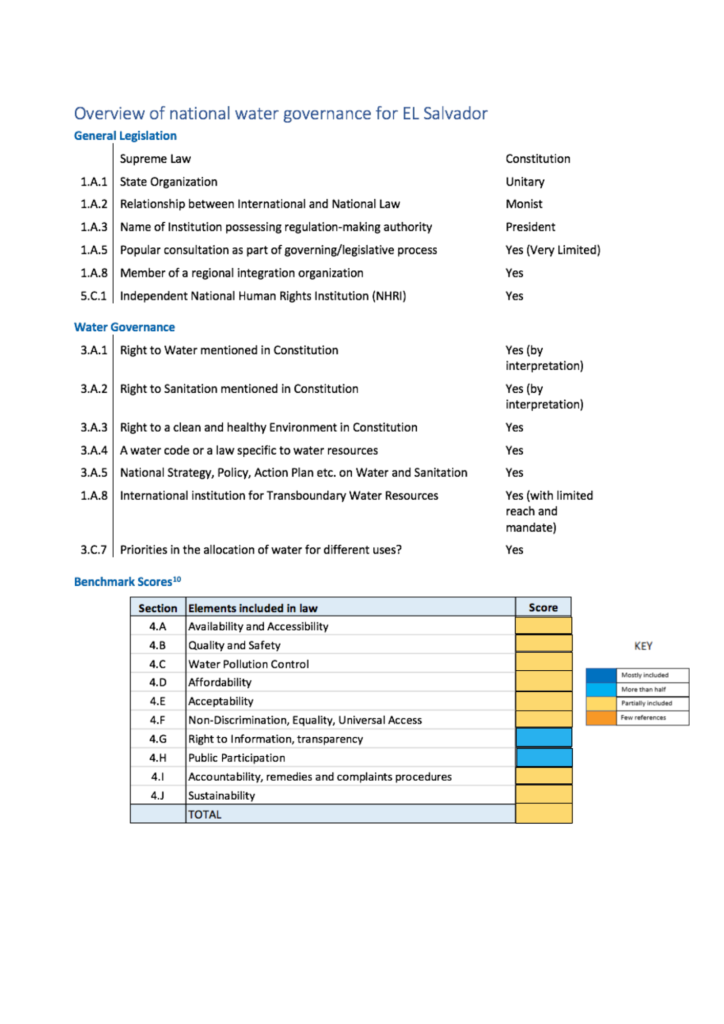Individuals have the right to be informed, in a clear, sufficient, and timely manner, of any policies that impact the environment and the health and quality of life of the public. El Salvador scored well on aspects of the legal assessment developed by HR2W to determine how the human rights to water and sanitation (HRWS) and the human right to a clean and healthy environment (HRHE) support each other in the legislation, especially regarding Public Participation and the Right to Information and Transparency. There is an Environmental Law establishing the public’s right to participate in the management of the environment. Furthermore, there is also a Water Registry open to the public which is required to include information on water operators, for example, allocations to public entities that use water resources and permit information. The Water Law is needed to provide a unified comprehensive framework for managing water use across all sectors. Download the full Country Assessment: here
El Salvador is a unitary presidential republic with a central government. It is divided into 14 departments, 39 districts, and 262 municipalities. There are three government branches: the legislative, the executive, and the judiciary. In 2022, when the General Law of Hydrological Resources came into force, the Salvadoran Water Authority became the autonomous authority responsible for integrated water management and implementation of the water law.
At a local level, the National Administration of Aqueducts and Sewerages (ANDA in Spanish) provides potable water and Sanitation. Additionally, for areas where the ANDA cannot offer its services, there are over 2500 Water Boards that in 2020 serviced around 18.02% of the country’s total population and about 52.8% of the country’s rural population. These Water Boards do not participate in the decision-making process. Lastly, Associations of Communal Development work with the municipalities to promote and implement projects to improve the quality of life for the local population.

El Salvador has ratified several regional and international treaties. Some of the treaties that are explicitly related to the right to water are:
- Article 14.2 of the Convention on the Elimination of All Forms of Discrimination against Women
- Article 24 of the Convention on the Rights of the Child
- Article 28 of the Convention of the Rights of Persons with Disabilities
- Article 11 of the American Convention on Human Rights “Pact of San José”
- Articles 11 and 12 of the Protocol of San Salvador
The full list of treaties and conventions has been listed in the document.
As for the domestic legislation on water, the right to water is not mentioned in the constitution. However, the Supreme Court of Justice held in an Amparo that the Constitution does protect the right to water and that policies must be implemented that facilitate, promote, and guarantee access to sanitation facilities. Furthermore, El Salvador’s congress approved a national strategy for water and sanitation in 2018 and a Water Law in 2021. The right to a healthy environment is explicitly mentioned in the constitution and several environmental laws and strategies to protect the environment. There is legislation available to regulate the extraction of water and other activities in order to guarantee its protection.
Lastly, the document also analyses El Salvador’s judiciary system. The State relies on the ANDA and other decentralized operators for its water needs. They can raise complaints through several platforms. Additionally, there are other Human Right Agencies that are able to provide these same services, for example, there are Environmental Courts to which individuals can file civil cases against persons, the government, and other nongovernmental entities. In general courts in the country have the jurisdiction to hear cases regarding the obligations to respect, protect, and fulfill the human rights to a healthy environment depending on the underlying cause of action.
Download the full Country Assessment: here
Disclaimer: This is not a statement of compliance nor a legal review of this country. White & Case has provided valuable pro bono assistance for this project but bears no responsibility for the benchmarking of countries in the dashboard which reflects the sole view of Human Right 2 Water.
This information is a desktop review and has been generously provided as pro bono support, based on a preliminary research of the legal framework in this country. It will be verified by our legal team .in collaboration with local authorities.

